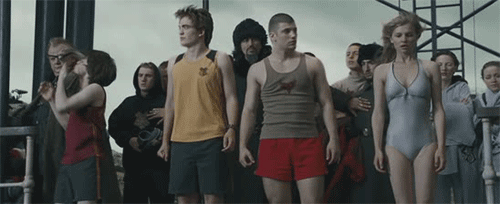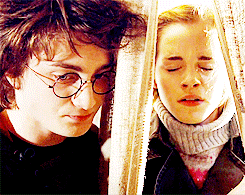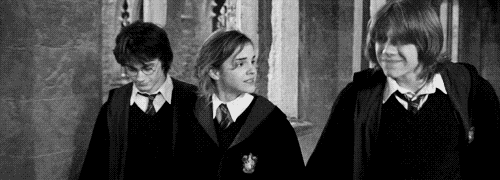The Most Underrated Elements of “Harry Potter and the Goblet of Fire”
Previously, I highlighted some of the most forgotten moments of Harry Potter and the Prisoner of Azkaban. Now, I turn to Harry Potter and the Goblet of Fire, the book that raised the stakes for our favorite characters. Goblet of Fire introduces us to a much wider wizarding world – literally, the book is twice the size of those before it – and offers up an intricate, richly detailed, riveting plot. After ten years of rereads, the story still completely captivates me, but Goblet of Fire is primarily seen as a setup for the second half of the Potter series, ranking near the bottom of the list for many Potter fans. Here are some of the many important elements of Goblet of Fire that fans often overlook.
1. The Fear and Darkness
But now, a short, angry wizard stood before him, refusing, point blank, to accept the prospect of disruption in his comfortable and ordered world – to believe that Voldemort could have risen” (707).
Voldemort’s return does not mark the beginning of a dark and fearful wizarding world; that fear, as we learn from this story, has clearly existed for quite some time. Dementors guard Azkaban, nonhuman magical beings remain wandless, and house-elves remain brutally oppressed because of that fear. Voldemort turned to the Dark Arts out of fear and ruled with fear, and Barty Crouch, Sr.’s vicious tactics during Voldemort’s first reign had massive popular support because of that fear. Cornelius Fudge vehemently denies Voldemort’s return and turns his back on Dumbledore out of fear. Fear has long been a justification for many atrocities in the wizarding world, and Voldemort’s return only brings that fear fully to light.
2. Harry’s Strength
You have shown bravery beyond anything I could have expected of you tonight, Harry. You have shown bravery equal to those who died fighting Voldemort at the height of his powers. You have shouldered a grown wizard’s burden and found yourself equal to it…” (699)
Harry proves to be a real contender against three older, more experienced wizards in the Triwizard Tournament. He is the only person in his Defense Against the Dark Arts class who is able to completely throw off the Imperius Curse. In the graveyard, he is even able to resist Voldemort’s Imperius Curse, and he stands up to duel him after being tortured with the Cruciatus Curse twice. Harry’s ability to stand firm against Voldemort does not come from his connection to Voldemort or mother’s protection, but – much like his ability to take the Sorcerer’s Stone from the Mirror of Erised – from the tremendous strength, courage, and purity of heart he possesses at such a young age.
3. The Other Three Champions
Cedric Diggory embodies the qualities of Hufflepuff House; he’s kind to Harry, he’s an honest competitor, and he works hard to earn his success in the Tournament. When the life of such a good man is senselessly taken, the whole castle and the wizarding world beyond is shaken to its core. Fleur Delacour seems aloof, but only because she doesn’t have the patience for people who – like Roger Davies at the Yule Ball – can’t see past her looks and don’t take the time to earn her respect. Viktor Krum makes a real effort to get to know Hermione, something even Harry and Ron don’t do, and openly shows his deep respect and admiration for her. He remains grounded despite his fame and Karkaroff’s influence. All three are complex, important characters and steadfast friends.
4. Hermione’s Role in the Story
You do realize that your sheets are changed, your fires lit, your classrooms cleaned, and your food cooked by a group of magical creatures who are unpaid and enslaved?” (239)
Hermione saw clearly from the beginning how cruelly wizards treated house-elves – something most wizards refused to see, insisting that, as Ron said, “they like being enslaved” – and fought hard to make her fellow students take her cause seriously. She refused to submit to Rita Skeeter’s tyranny despite receiving piles of hate mail and fought against her lies by herself, eventually taking her down in triumph. She stayed at Harry’s side when even Ron could not and supported him throughout the Triwizard Tournament. Hermione may not have fought at Harry’s side in this book, but that does not mean she didn’t fight at all.
5. The Bond Between the Golden Trio
He liked it best when he was with Ron and Hermione and they were talking about other things, or else letting him sit in silence while they played chess” (717).
Harry and Ron are miserable without each other when they briefly fight after Harry is entered into the Tournament. When they finally reconcile, Harry doesn’t even need to hear Ron’s apology; his heart instantly becomes lighter with Ron at his side. Harry turns to Hermione for advice, comfort, and protection. After the events of the graveyard, Harry can tolerate the company of only Ron and Hermione, who never leave his side and don’t force him to talk about what happened. The strength of their friendship will be most valuable to Harry in the dark years to come.





